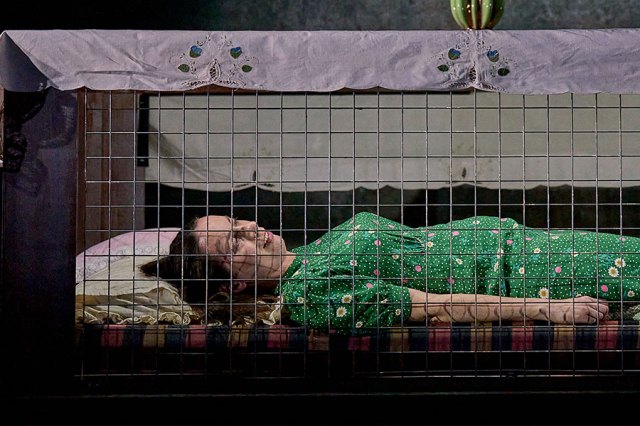Reviews
all of it at the Royal Court – review
Alistair McDowall and Kate O’Flynn team up for a triptych of monologues

You need to be a pretty special actor to have plays written for you (amazingly, Prima Facie wasn’t even created with Jodie Comer in mind, although you’d hardly know that from watching it), but Kate O’Flynn is one such unique artist. Alistair McDowall has penned a trio of monologues/theatrical poems for this fine performer that showcase her extraordinary ability to turn on a dime from tough to tender, and to project an unusual, fascinating mixture of fragility and granite-like fortitude.
O’Flynn is compelling: at once earthy and relatable, with impeccable comedy instincts and timing, yet ethereal and magnetic. She is the perfect match for McDowall’s writing which switches between stark and spare to extravagant, consistently engaging even when at its most elusive. She captures his cadences, subtleties and most particularly his rhythms to such perfection that they feel almost hardwired into her, so that it feels less like watching a theatrical performance than a series of lived experiences, or possibly a possession, albeit not a demonic one.
McDowall writes female characters extremely well (his salty, spicy women in the Royal Exchange/National Theatre success Pomona lingered in the memory way longer than the men) and he has a refreshingly unfettered imagination that fearlessly marries witty realism with a gorgeous sense of wonder. This was typified in his The Glow, which played on this stage last year and was an ambitious consideration of the imagery of women in art and history through the ages. all of it is less flamboyant but shares the same sense of unpredictability and marvel.
The first tranche of the show, “Northleigh 1940”, is a touching, troubling examination of small lives set against big events, namely the Second World War, as perceived by a lonely clerical worker stuck at home with her father while the air raids rage on overhead. There are shades of Coward at his most melancholic and Rattigan in some of the observations, and there is an Anita Brookner-ish feel to the juxtaposition of resignation and biting wit. O’Flynn delivers it with truth and charm, even when lying prone in a homemade bomb shelter.
Next up is the Beckettian “In Stereo”, a bizarre sketch of a sole character in front of a tv in a room nondescript except for the creeping and creepy feeling that it’s being engulfed by mould (simple design by Merle Hansel, hauntingly lit by Elliot Griggs). She encounters an alternative version of herself, before possibly crawling back into the womb, then being subsumed into the walls that contained and oppressed her, standing passively bearing witness to the lives of subsequent generations of people who inhabit the same house. Accompanied by her own pre-recorded voice and then a cacophonous set of versions of that voice (unsettling sound design by Melanie Wilson), O’Flynn effectively charts the devolution from passive humanity to inanimate observer, and the language fractures around her as the house is destroyed leaving the solitary wall exposed to the elements. The transition from bleak humour to apocalyptic is sensitively done, but the piece as a whole is too impenetrable to be truly affecting.
The real meat of the show comes in the final section, the titular “all of it”, less a monologue and more a piece of performance art so searing and perceptive that it makes the earlier two pieces look a bit superfluous. It was actually presented as a standalone piece on this same stage in early 2020 and felt like a satisfying course of theatre all by itself then, and it’s now neither enhanced nor diminished by the addition of the other monologues, although O’Flynn’s stamina is impressive. It quite literally is about “all of it”: it’s a fast paced, poetic representation of an entire life, from birth to death, no more and no less, in just 40 minutes. A still but vocally and facially animated O’Flynn, mouthing into a microphone, articulates everything from infant discoveries to sexual awakening, through love, childbirth, bereavement, geriatric bewilderment and finally the great inevitable. It’s incredibly moving, so much so that you almost don’t appreciate the virtuosic work involved as O’Flynn goes through the unnamed character’s stages of life, her voice beginning as a babyish squeak and ending up as an exhausted, lugubrious drawl. “Think I had a good life, but it’s hard to tell really,” she concludes, “I don’t have anything to compare”.
O’Flynn is unforgettable and it’s a remarkable piece of writing, worth the wait, but so complete and all-encompassing it runs the risk of making one wonder what really was the point of the two companion pieces beyond stringing the entire evening out to 90 minutes. Interestingly, the published edition of this trio of scripts goes under the collective title Three Poems, and one wonders why this production didn’t also adopt that title. Either way, “all of it” itself is a mini masterpiece.
It may partly be Kate O’Flynn’s Northern accent (she hails originally from Bury in Greater Manchester), also the starkness of Vicky Featherstone and Sam Pritchard’s flawless staging, and the elliptical nature of McDowall’s creations, but the overriding take away thought from all of it as a whole, beyond seeing one of this country’s most exciting actresses at work, is that this is what a collaboration between Beckett and Bennett (Alan) might have looked like. Either way, it’s a tour de force, and she is astonishing.
















